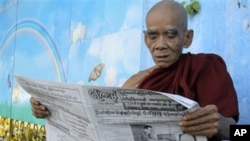Western and Asian nations are voicing disappointment with Burma's controversial election, which appears certain to give two pro-government parties a strong majority in parliament.
In Australia, where the U.S. secretaries of state and defense were meeting with their counterparts Monday, the two countries expressed "regret" that the elections were neither free nor fair.
Japan, the Philippines New Zealand and the European Union also issued statements saying the elections had failed to move Burma toward a real democracy. China had no official comment, but an article in the state-run Global Times described the ballot as a "step forward" and called for patience.
Burmese opposition parties are complaining of widespread fraud in Sunday's election, the country's first in 20 years. They also say authorities pressured voters into casting ballots for the military government-backed parties.
Officials have not said when the results of the voting for a 2-chamber parliament and 14 regional assemblies will be announced. But analysts say there is little doubt the Union Solidarity and Development Party will emerge with the most parliamentary seats.
The election rules set earlier this year reserved one-quarter of parliamentary seats for the Burmese military and created obstacles for opposition and ethnic parties.
Opposition leader Aung San Suu Kyi was locked up during the election, and most foreign journalists and international observers were barred from monitoring the vote.
U.S. President Barack Obama and British Foreign Secretary William Hague denounced the election as neither free nor fair in separate statements Sunday.
White House officials said the election in Burma failed to meet any of the internationally accepted standards for legitimate elections. Officials cited the military government's continued detention of 2,100 political prisoners as one of the "starkest flaws" of the election process.
Aung San Suu Kyi's National League for Democracy boycotted the vote because of what it said were unfair rules. It won the country's last elections in 1990 but the military refused to let it take office. The party was dissolved earlier this year.
Reports from the main city, Rangoon, said voter turnout Sunday appeared low and streets were quiet as riot police patrolled key intersections.
Burmese state media announced some results hours after the polls closed Sunday, declaring victories for several military-allied candidates who ran unopposed.
Western, Asian Nations Criticize Burmese Election




